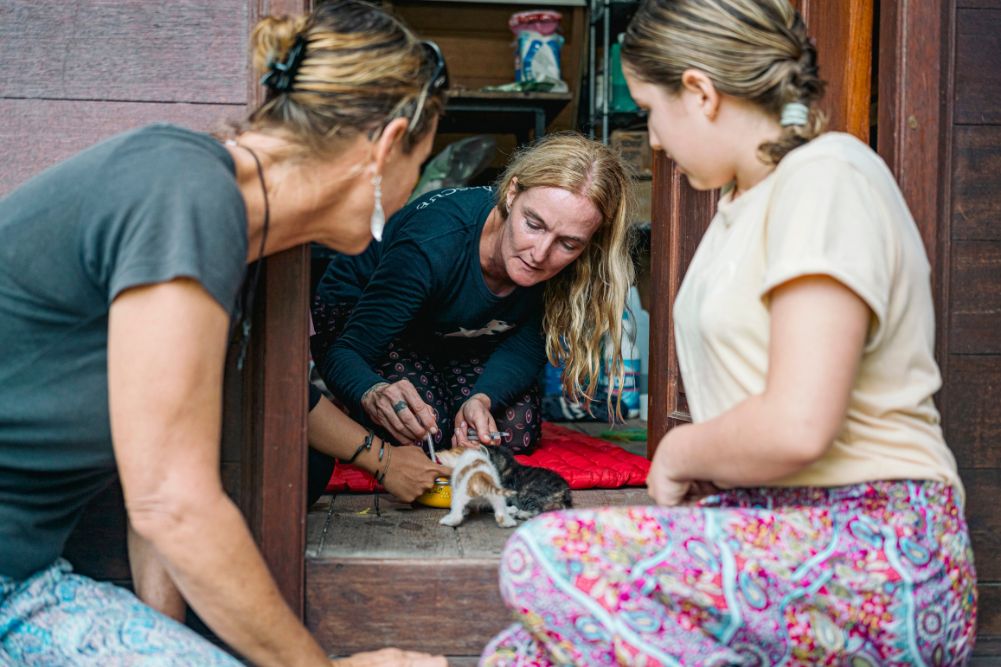How to invest ethically
In the past few years, ethical investment (also known as socially responsible investment, or SRI) has taken off in Australia. New SRI funds proliferate and the Australian monthly magazine Ethical Investor is believed to be the first of its kind in the world to go on newsstands.
When selecting a viable SRI, consumers might ask themselves the essential question: What is an ethical investment and what is not? There are different shades of ethical and its worth critically examining the products on offer when shopping around. For example, not everyone wants to support British American Tobacco, a company investing in military-controlled Myanmar (Burma) and a surprise inclusion last September in the Dow Jones Sustainability Index.
SRI often involves the application of two different types of investment screening: negative and positive. Negative screens filter out companies involved in certain dubious areas (the most common being the nuclear industry, armaments, tobacco, gambling and animal testing). Positive screening supports those companies working to create a better world, is more proactive and often considered a better outcome. Many funds have a mix of both.
A number of SRI funds apply somewhat weak negative screening criteria. This allows them, for example, to invest in mining companies and in the big four banks, which have been criticised for levying high charges while shutting down branches in smaller communities. Some concern has also been raised about best of sector SRI funds that handpick companies within each industry sector on the basis of good environmental practices. The downside is a general absence of negative screens. It could be argued that ranking tobacco and arms companies on the basis of sustainability might be a case of missing the point.
The Dow Jones Sustainability Index, produced by Zurich-based Sustainable Asset Management, is organised along best of sector lines, allowing it to include a wide range of multinationals. As it has no uranium screen, these include Rio Tinto, a company with Australian uranium mining involvement.
Certain funds have also come under criticism for failing to apply their stated pollution and uranium mining screens by including certain companies.
Suggested approaches to this problem include:
- Checking out funds with a financial planner specialising in ethical investment.
- Finding out which companies are held by a particular fund and researching them via the Internet.
- Choosing a financial institution that invests in community projects rather than shares.
SRI and returns
Diehard perceptions that sticking to ethical values will damage a firm’s bottom line are shifting. According to the World Business Council for Sustainable Development, applying sustainability criteria makes firms more competitive, more resilient to shocks, nimbler in a fast-changing world, more unified in purpose, more likely to attract and hold customers and the best employees, and more at ease with regulators, banks, insurers and financial markets.
Two US ethical share indexes, the Domini 400 Social Index and the Citizens Index, have outperformed the main share market index (S&P 500) since their inception in 1990 and 1994 respectively. A 1999 US Social Investment Forum survey found that SRI returns exceeded non-screened returns over one- (10.64 per cent/8.66 per cent), three- (13.71 per cent/10.70 per cent), five- (11.51 per cent/9.76 per cent) and 10-year (11.76 per cent/11.05 per cent) periods.
A recent report by ABN AMRO Asset Managements Global Consulting Group, based on 18 studies conducted over the past 20 years, concluded that overall there is a positive relationship between a firms social and/or environmental behaviour and its financial performance. However, not everyone agrees that ethics equal profit. A 2002 analysis carried out for the Social Investment Forum found no significant difference in risk-adjusted returns between SRI and non-SRI.
Australian SRI investments
The Ethical Investment Association (EIA) 2002 Benchmarking Survey showed exponential growth in the ethical investment field, with Australian SRI assets growing 32 per cent to $13.9 billion. From 1996 to 2002, managed fund SRI assets grew by over 700 per cent. A 2000 KPMG survey of the public showed that 88 per cent of respondents were concerned about investments in companies using child labour, while 76 per cent identified the logging of old growth forests and 71 per cent mentioned tobacco.
The shift towards SRI was boosted in 2002 by a successful amendment to the Financial Services Reform Act, drafted by Michael Kerr, legal advisor to the Australian Conservation Foundation (ACF). The Act became law in March 2002 and is likely to reassure the trustees of superannuation funds that investing ethically is not in breach of their responsibilities.
To complement the work of the EIA, last May saw the launch of the Christian Centre for Socially Responsible Investment (CCSRI), an organisation set up to help Christian funds and their managers deal with emerging ethical investment issues in a fast-growing SRI climate.
Overseas developments
SRI has considerable influence in the UK and in the US, where at least 12 per cent of all dollars under management are in screened funds. The growing influence of SRI criteria in the UK is reflected in a 10-fold growth from 23 billion pounds worth of investments in 1997 to 225 billion in 2001.
Other UK findings from 2000 showed that while 59 per cent of pension funds (representing 78 per cent of assets) were found to be incorporating SRI principles in their investment process, only 14 per cent of such funds (generally the smaller ones, representing four per cent of assets) said they would not take environmental, social and ethical concerns into account.
At the time of writing, nine US municipalities had committed not to buy bonds issued by the World Bank, in protest against what they regard as that institutions funding of projects that promote global injustice. This boycott campaign has now spread to Europe and South Africa.
SRI and the insurance industry
Perhaps surprisingly, its the insurance industry that has been applying some of the strongest pressure towards an SRI future. With a steady increase in the frequency of natural disaster, the cost of weather-related incidents to the industry has been growing exponentially. Insurance companies are among the worlds most powerful investors, controlling huge life insurance and pension funds. The result has been a gathering momentum towards investment in sustainability and renewable energy.
In 1997, Swiss Reinsurance pledged US $2.75 million to SunLight Power International, a company that supplies solar power to developing countries, becoming its largest investor. Many other funds are also turning their attention to renewables. Canberra-based Australian Ethical Investment directs between 10 and 15 per cent of its total portfolio value into the renewable energy sector, including Pacific Hydro, Nimbins Rainbow Power Company and Advanced Energy Systems in Perth.
Shareholder activism
Several US SRI funds have ventured into the burgeoning field of shareholder activism, which aims to reform corporate behaviour by harnessing voting capital to support specific resolutions. The issue-based shareholder movement has been most active in the US, where the Interfaith Center on Corporate Responsibility controls US $110 billion and has been filing around 100 resolutions each year.
In Australia, an ongoing campaign by The Wilderness Society (TWS) is targeting the woodchip company Gunns over its Tasmanian old-growth logging activities. In July 2002, TWS and more than 500 shareholders in the ANZ, Westpac, Commonwealth and National banks handed in a resolution calling for an end to investment in old-growth forest logging. A Gunns letter to send to your super fund can be downloaded at www.wilderness.org.au/campaigns/corporate/gunns/super.
Last year, Kairos, the Canadian church coalition on corporate responsibility, issued a shareholder challenge to the Canadian oil company Talisman Energy for what Kairos regards as the companys complicity in Sudanese human rights abuses. People in the south of the country have been killed or violently removed from their villages because they live on oil-rich land. Early this year, Talisman sold off its Sudanese interests.
The Social Investment Forum believes a phase-out of toxic mercury by US thermometer manufacturers and moves to increase levels of recycling by Coca-Cola and PepsiCo can both be directly attributed to shareholder activism during 2001. The 2003 proxy season in America is set to break new records in the number of resolutions and levels of shareholder support, the top two issues being global warming and excessive CEO remuneration.
Community capital builds a network
Australian ethical financial institutions with a focus on community investing include Foresters ANA (Brisbane), Investors in Community (Sydney) and the Bendigo Bank/Community Aid Abroad Ethical Investment Trust (Melbourne).
Foresters ANA is worth a special mention for the fact that it has been running continuously since 1890 and for the strongly grassroots orientation of its lendings, largely in the Brisbane area. Recent loans have been made to environmental businesses, cooperatives, housing coops, crisis housing, womens groups and to provide refugee accommodation. Together with the nearby Maleny Credit Union, it recently launched the Community Capital Project, funded by the Queensland Department of Family and Community Services. At a 2002 conference held in Maleny, the Community Capital Builders Network was launched, with the aim of directing SRI financial resources into community development.
In unpredictable times, such an investment strategy can provide a secure return insulated from the risk of any stock market losses. Overseas, the JAK Bank operating in Sweden and Denmark is a community finance institution that has gone one step further by offering interest-free loans. Its members earn savings points, the value of which determines how large a loan they can take out. Given the current groundswell towards community investing, it looks likely that this local approach will gain more ground, offering people the satisfaction of knowing their funds are invested both ethically and locally, providing finance to small-scale initiatives with a tangible social benefit.
Contact
General SRI and shareholder activism
- Ethical Investment Association. T: (02) 8224 0314
- Ethical Investor. T/F: (02) 6682 4830
- Social Investment Forum (UK). www.uksif.org
- Social Investment Forum (US). www.socialinvest.org
- Social Investment Organisation (Canada) www.socialinvestment.ca
Community capital
- Community Capital Builders Network. T: (07) 3266 4411
- Foresters ANA, T: (07) 3266 4411
- Maleny Credit Union, T: (07) 5494 2144
- Ethical Investment Trust, T: (03) 9289 9403
List of Australian SRI financial advisers and planners www.eia.org.au/frame_files/who_frame.asp?show=1
Australian 2002 SRI survey www.eia.org.au/PDF/eia-benchmarking-survey-2002.pdf
2000 KPMG(OK) public attitudes survey www.eia.org.au/pdf/resources_kpmg.pdf
Ethical super opportunities
Superannuation is by far the most common type of investment held in Australia. Unfortunately, many funds still dont take ethics into account, and some are unwilling to disclose the names of the companies they are investing in. The first Australian ethical super fund was created in 1993 by the Brisbane-based friendly society ANA (now Foresters ANA). Since then, dozens of others have followed suit in introducing various forms of ethical screening.
A substantial number of people have been losing touch with one or more of their super funds through changes in employment. This common obstacle hinders ex-employees who would like to roll it all over into a single ethical fund; while they procrastinate, holding super in several different funds is likely to attract unnecessary fees. Below is a step-by-step guide to help find lost super.
- If you don’t have any old forms or letters from the fund, check with the ATOs Lost Members Register, which lists those people reported by super funds as lost to the ATO. Telephone: 131 020, or download an enquiry form at www.ato.gov.au/content/super/16442.htm and send it in.
- If this fails, its possible the super fund hasnt reported you as lost. In this case, contact your former employer and ask them which fund they used. If the employer no longer exists, contact the industrial relations department in the state or territory where you worked and ask whether the super would have been paid into a particular industry fund.







